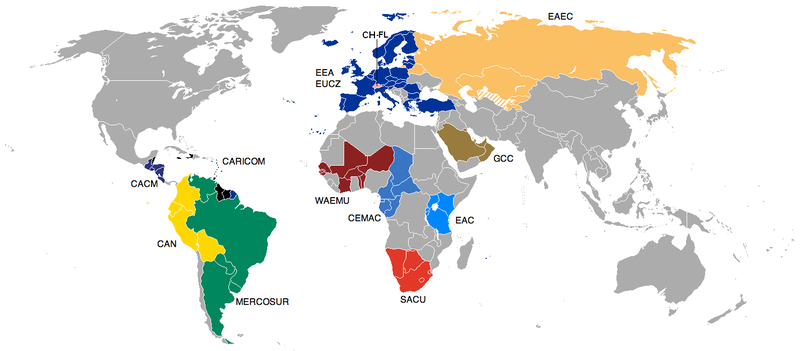The most underreported aspect of the current crisis over the Crimea annexation is the extent to which Russia was willing to go to the brink of international crisis for the goal of a future trade bloc. ![]()
![]()
Why does Russian president Vladimir Putin care so much about the vaunted Eurasian Union, even though it’s a rewarmed version of the existing economic customs union among Russia, Belarus and Kazakhstan?
To turn Michael Corleone’s words on their head, ‘it’s personal, not business.’
Putin hoped that the revamped union could attract a few more stragglers in central Asia, Azerbaijan or Armenia and perhaps Ukraine — until February 22.
There are certainly potential gains from greater free trade, and negotiating multilateral trade blocs seems both more efficient than one-off bilateral agreements and more productive than pushing for greater global integration through the World Trade Organization (WTO) process.
Also unlike bilateral treaties or WTO-based agreements, regional trading blocs are also emerging as strategic geopolitical vehicles for advances regional agendas that have just as much to do with politics as with trade.
Ultimately, it’s same reason that the two South American customs unions, the Mercado Común del Sur (MERCOSUR, Suthern Common Market) and the Comunidad Andina (CAN, Andean Community) joined to form the even larger Unión de Naciones Suramericanas (UNASUR, Union of South American Nations), which came into existence in 2008 and covers the entire South American region.
It’s the same reason that Kenyan president Uhuru Kenyatta has put so much pressure on Tanzania to choose between the East African Community (EAC) or the Southern African Development Community (SADC) over the past year by accelerating plans for greater political cooperation within the EAC — with or without Tanzania. Or why admitting South Sudan into the EAC back in 2011 could have helped prevent its slide into civil war.
It’s the same reason that defining ‘Europe’ has been such a strategic and existential issue for the European Union and its predecessor, the European Economic Community, since its inception. Does the United Kingdom belong? (In the 1960s, according to French president Charles de Gaulle, it didn’t). How to handle Turkey? (Enter into a customs union with it, then slow-roll accession talks since 1999, apparently). Should Ukraine join? Moldova? Georgia? If Azerbaijan can win the Eurovision contest, why not bring it into the single market? What about, one day, Morocco and Tunisia, which both have association agreements with the European Union?
That’s why it’s worth paying close attention to the Trans-Pacific Partnership (TPP), but also the Transatlantic Trade and Investment Partnership (TTIP). TTIP would create a super-free-trade-zone between the United States and the European Union, which together generate between 45% and 60% of global trade.
Continue reading Trade blocs form the new borders of the 21st century global order

